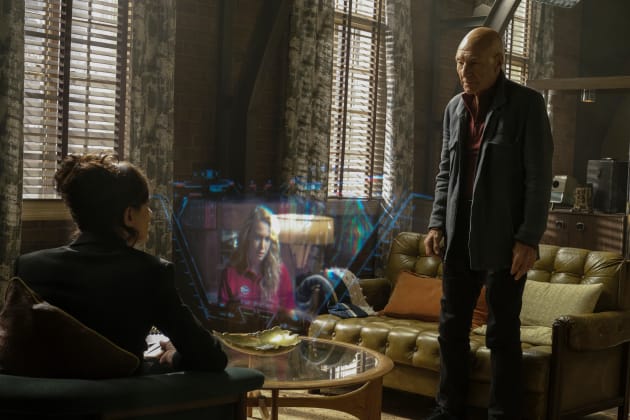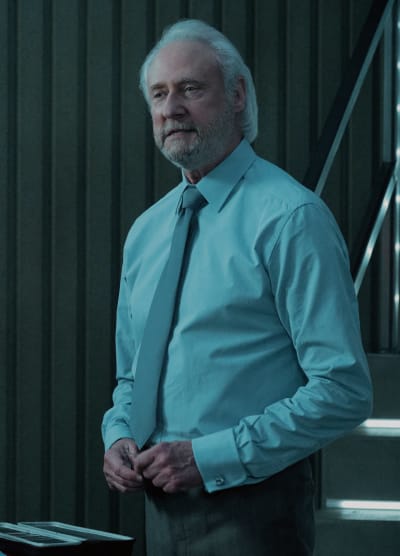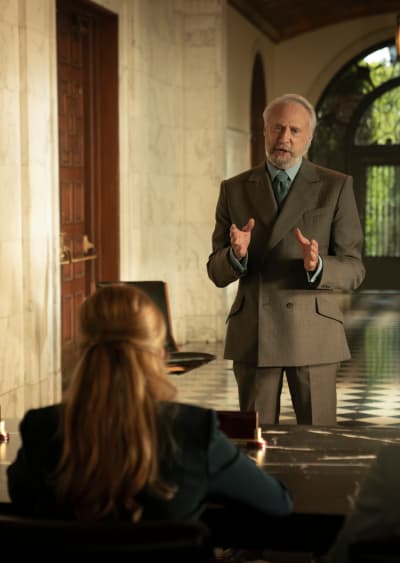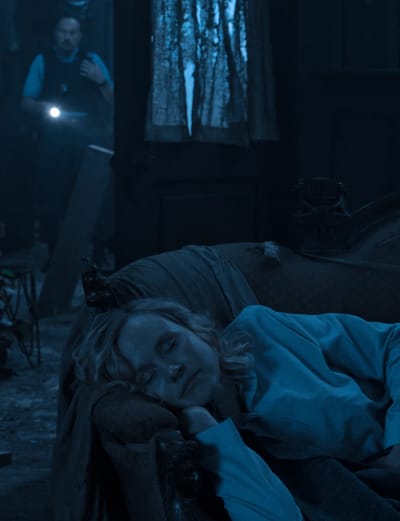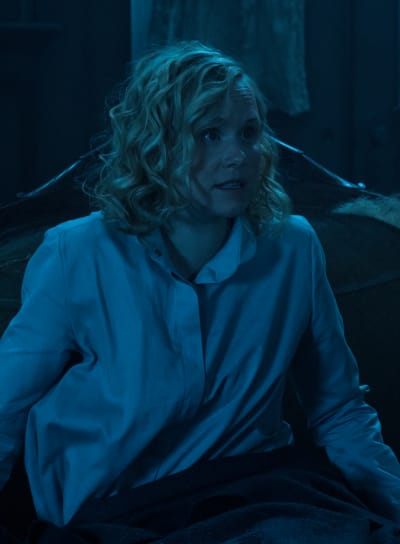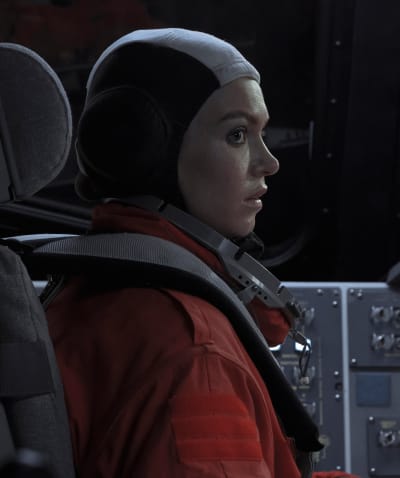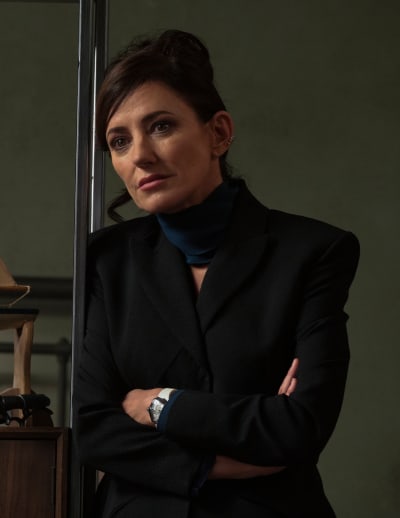Ah, there’s a lot of fanbase joy fueling Star Trek: Picard Season 2 Episode 5. With Jonathan Frakes directing, Brent Spiner and Isa Briones back on screen, and a heist-like plot introduced, it’s hard not to smile blissfully and just ride this shuttle as far as it can freefall.
Two significant elements to the mystery of the time fissure are now in play. Q intends to sabotage Renée Picard’s influence on the future path of Earth’s space exploration. Meanwhile, Dr. Adam Soong — seen as a talking holographic monument in the Wake-Up World — is also at a crucial crossroads in his research.
The drawback to presenting a plot with many moving parts in an episodic series format is that you can spend an hour flitting between four or five disparate settings to establish the foundational narrative. Through some elegant editing and very tight pacing, “Fly Me To the Moon” holds together well.
This season has been filled with fun callbacks and Easter Eggs.
Having Back to the Future star Lea Thompson, now an established director, helm Star Trek: Picard Season 2 Episode 3, where they travel back in time — a time that actually is in our future — as well as Star Trek: Picard Season 2 Episode 4 is some genius hiring.
And she still shines in front of the camera as well. As Dr. Diane Werner, the chairman of the panel reviewing Dr. Adam Soong’s research, she gives him a formidable dressing down on his loose interpretation of ethics in pursuit of the greater good.
Picture a world free of genetic defects. If I had the power to nudge us in the right direction, isn’t that my responsibility?
Adam Soong
Besides being a fun inclusion of Thompson, it’s a wonderfully engaging way to introduce this newest iteration of Dr. Soong, who is just as misanthropic as any human Soong we have ever met in the Trek-verse.
If I could encapsulate all the knowledge I’ve gained through the years from life experience and careful study into a single pearl of wisdom for you, it would be this. People are idiots.
Adam Soong
Every time we encounter a Soong, we can’t help but wonder at the curmudgeonly genius from whence our dear, sweet Data springs.
While Noonian Soong embodied the god-complex megalomaniac archetype, and both Arik and Altan showed that they could temper their brilliance with humanity under duress, Adam Soong’s motivations seem more desperate and mundane, a man willing to defy ethical codes to cure his daughter, Kore.
Q: What a sad, sad irony. A geneticist whose daughter has an incurable genetic disease? Sunlight burns like fire? Air turns to acid?
Adam Soong: Nothing, nothing is incurable.
Q: Well, you have neither the time nor the funding to prove that theory.
It can safely be assumed at this point that if any Soong is going to have offspring, they’ll be cast in the image of Isa Briones, whether they be human, synth, imaginary, or holo.
Considering how the Soong men seem to share a singular level of anti-social attitude, it’s a bit of a riddle as to how the bloodline manages to survive from Adam through Arik and down to Noonian and Altan.
Kore mentions her mother, but we can assume she’s died or left. Perhaps she had the same genetic disease Kore has?
Arik’s “children” on Star Trek: Enterprise were stolen, genetically manipulated embryos. Altan is apparently Juliana’s stepson, and his “children” are synths.
So who are these women who keep falling for Soong men and having their boy babies, and where are they when their progeny inevitably turn into their fathers?
We’re all hostages to what we love. The only way to truly be free is to love nothing. And how meaningless would that be?
Q
Adam’s need for a cure for Kore leaves him vulnerable to Q’s manipulation.
It also foreshadows many of the questionable choices his descendants will make in their careers, leaving them disconnected from society and intimacy.
Adam Soong: You know I’ll kill you if I think you’re a threat.
Q: Yes, and that’s what I like about you.
Adam Soong: Who the hell are you?
Q: I am the evolution of stardust. I’m the gentle flutter of a butterfly. I am Death, Destroyer of Worlds. And I’m also a big fan of your work and a visionary who knows how important you are to the future of this planet.
Adam’s only connection seems to be Kore. Her well-being motivates his research, his risks, and his willingness to make a deal with someone like Q.
To be sure, getting in bed (figuratively) with Q is almost as dubious as parleying with a Borg queen.
This, considering we are meant to believe that Jurati is the genius batting for the white hats, creates a clever parallelism within this script.
Borg queen: You’re alone, Agnes. In every timeline, every permutation, in every reality of this universe, you are utterly alone.
Jurati: Stop talking.
Borg queen: That is your fate. Forever invisible. But I could change all of that. Imagine being loved completely. Every thought and whisper cherished, shared. With our minds joined as one, we could be more. I am the only one in the entire universe that has ever truly seen you.
But where Q dangles a carrot to coerce Adam Soong into working with him, the Borg queen resorts to the stick of threatening an innocent police officer.
In a troubling echo of her Star Trek: Picard Season 1 dilemma, Jurati kills in the interest of the greater good, but then the twist is that she and the queen are linked. Killing the queen means dying herself, and she pivots again to the greater good (slash self-preservation) and allows the queen to download (?) into her brain.
So, to recap, Jurati is once again the double agent on the team. And another step closer to becoming the Borg queen who boards the Stargazer on Star Trek: Picard Season 2 Episode 1.
Speaking of getting into people’s heads, how wacky is it that when Q’s supernatural powers fail him, he turns to psychology? LOL. And the pseudo-Freudian accent wasn’t over the top at all.
Detail-oriented viewers will recall that Jean-Luc Picard mentioned his ancestor, Renée, in his speech to the Academy on the season premiere. Chalk it up being raised in a patriarchal culture, but I honestly assumed Renée to be a René.
Tallinn’s description of Renée’s remarkable abilities and emotional challenges feels somehow connected to Picard’s motley memories of his mother.
Like others in my profession, I have a singular purpose. I have devoted my entire being to protecting one individual, a single string in a grand tapestry to which I’m not privy.
Tallinn
She may only be a thread — albeit an important one — in the tapestry, but Renée’s resilience is a cosmic question mark. The stress on her thread is such that snapping is always an option.
Why else would a Supervisor be assigned to her, specifically? Her presence or absence on the Europa mission tips the scales of time itself, and Q is there to tweak that thread in whatever way he can.
The eighteen hours to ensure Renée goes through with the mission compresses the three days originally floated from urgent to imperative.
I appreciate JL’s suggestion of just drugging her for the interim hours until quarantine. (It just goes to show how much Captain Picard of Star Trek: The Next Generation Season 1 Episode 1 has grown as a person in thirty-five years.)
Of course, it wouldn’t be much fun if it wasn’t (over-)complicated, right?
Rios: You’re sending in the roboticist? Not the ex-spy or the Ranger?
Jurati: All right. We get it.
Picard: Jurati has all the skills we need. And I have a plan.
While the season plays with the episode shaping on a weekly basis, the consistent feature is the tantalizing closing shot.
It’s serialized television at its best but understandably frustrating in a world of full-season drops and binge-watching.
Will Jurati be able to manage her inner Borg queen while facilitating the system hack to get the team into the gala?
Who will be the first to clue in on the nanoprobe-carried rent-free squatter in her head?
Can JL and his team achieve the mission goal of getting Renée to go through with Europa while adhering to Tallinn’s strictly no-contact method of Watching?
What will Rios taste next that’ll make him fall in love with the 21st century all over again?
For Raffi’s sake, I hope that fixing time will bring back Elnor.
With the queen in Jurati’s head, Tallinn being a ringer for Laris, and Dr. Soong and Kore just around the corner, we don’t need our spy-master hallucinating people that aren’t there — or running headlong into unnecessary conflicts.
Seven: I get it. You’re angry. About Elnor. About Gabe.
Raffi: Don’t.
Seven: I know you. You need a target. Want to set your feet and fight.
Raffi: And all you want to do is run away.
Seven: That’s right. Because something that’s not moving is vulnerable.
At the same time, Seven has developed a level of ease with the world around her that she will lose when they’ve fixed the timeline and her Borg-ness returns.
So while we root for the mission’s success, the fly in the ointment is there will be sacrifices too.
Where will this adventure take us next? Will Adam and Kore encounter the team? How many butterflies does it take to implode the future?
Also, while I’m wondering about stuff like that, what about Rios’s badge? Is it still at the clinic? How was Jurati able to bring Rios back to the ship without it?
How is facial recognition not flagging Raffi and Seven after their disappearing act from the car chase with LAPD?
Is that French police officer just going to accept that he wakes up missing a spleen?
Jurati: I had to do it. She was killing him. He’s all right now. I repaired most of the internal organs.
Raffi: Most?
Jurati: His spleen’s in a box over there.
What are the chances that this whole season is just Jean-Luc Picard’s journey of self-discovery like Dorothy’s to Oz?
Pretty wild theory, right?
I’m still leaning towards the idea that we are seeing two different Qs — one who sabotages time and one who enlists Picard to fix it.
What’s your best theory to explain it all? Or are you just enjoying the ride? Beam your thoughts into the comments below!
Diana Keng is a staff writer for TV Fanatic. Follow her on Twitter.
